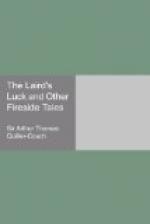“Now, in one way, the expedition had failed, for the caravels had been sent to explore the African coast beyond Cape Bojador, and as far south as might be; whereas they had scarcely put to sea before a tempest drove them to the westward, and far from any coast at all. Indeed, they had no hope left, nor any expectation but to founder, when they sighted the island; and so came by God’s blessing to the harbour which, in their joy, they named Porto Santo. There, finding their caravels strained beyond their means to repair for a long voyage, and deeming that this discovery well outweighed their first purpose, they stayed but a sufficient time to explore the island, and so put back for Lagos. But their good fortune was not yet at an end: for off the Barbary coasts they fell in with and captured a Spaniard containing much merchandise and two score of poor souls ransomed out of captivity with the Barbary corsairs. ‘And among them,’ said my friend Gonsalvez, ’your Highness will find this one old man, if I mistake not, to be worth the charges of two such expeditions as ours.’
“Upon this we all turned our eyes upon the Spaniard, who had been shrinking back as if to avoid the lamplight. He must have been a tall, up-standing man in his prime; but now, as Tristram Vaz drew him forward, his knees bowed as if he cringed for some punishment. ’Twas a shock, this fawning carriage of a figure so venerable: but when Tristram Vaz drew off the decent doublet he wore and displayed his back, we wondered no longer. Zarco pushed him into a chair and held a lamp while the Prince examined the man’s right foot, where an ankle-ring had bitten it so that to his death (although it scarcely hindered his walking) the very bone showed itself naked between the healed edges of the wound.
“Moreover, when Zarco persuaded him to talk in Spanish it was some while before we could understand more than a word or two here and there. The man had spent close upon thirty years in captivity, and his native speech had all but dried up within him. Also he had no longer any thought of difference between his own country and another: it was enough to be among Christians again: nor could we for awhile disengage that which was of moment from the rambling nonsense with which he wrapped it about. He, poor man! was concerned chiefly with his own sufferings, while we were listening for our advantage: yet as Christians we forbore while he muttered on, and when a word or two fell from him which might be of service, we recalled him to them (I believe) as gently as we could.
“Well, the chaff being sifted away, the grain came to this: His name was Morales, his birthplace Cadiz, his calling that of pilot: he had fallen (as I have said) into the hands of the Moors about thirty years before: and at Azamor, or a little inland, he had made acquaintance with a fellow-prisoner, an Englishman, by name Roger Prince, or Prance. This man had spent the best part of his life in captivity,




